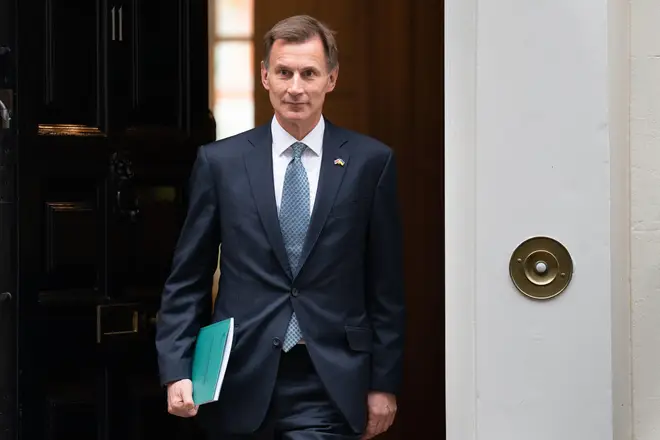
Clive Bull 1am - 4am
10 July 2023, 19:21
At a glance:

Chancellor Jeremy Hunt is set to promise 'evolutionary not revolutionary' reforms to get pension funds making billions of pounds of riskier investments in fast-growing firms to boost economic growth.
The Chancellor is to use a City of London speech later to detail plans to encourage the financial sector to "unlock capital" and increase returns for pensioners
Mr Hunt is launching the "Mansion House Reforms," aimed at boosting pensions by over £1,000 annually for the average earner and unlocking up to £75 billion in additional investment from defined contribution and local government pensions, while also promoting economic growth and supporting UK businesses.
The reforms include allocating a portion of pension funds to unlisted equities, introducing a Value for Money Framework, and streamlining regulations to attract more companies to the UK.
British pensioners should benefit from British business success. By unlocking investment, we will boost retirement income by over £1,000 a year for typical earner over the course of their career.
This also means more investment in our most promising companies, driving growth in the UK.
Alongside regulatory reforms, he will welcome an agreement with leading pensions firms to put 5% of their investments, a sum of up to £50 billion, into high-growth businesses.
Aviva, Legal & General and Phoenix Group are among those understood to be taking part.
Pensions firms welcomed that Mr Hunt was not making the move mandatory, as the industry had been warning against.
In his annual Mansion House speech, the Chancellor will pledge that changes will put the needs of pension savers "first and foremost".
"It will be an evolutionary not revolutionary change to our pensions market," he is expected to say.
Mr Hunt will pledge to prioritise a "strong and diversified" gilt market, meaning he was not forcing firms to favour riskier investments over the low-risk ones offered by the Government.
He will also set out a "golden rule" of never making changes that "compromise" the sector with what he is calling the Mansion House Reforms.

Caller says pensioners 'don't give a monkeys' about high housing costs
Nigel Peaple, the Pensions and Lifetime Savings Association's policy director, said: "The Chancellor has confirmed today that the pensions sector will keep their freedom to invest in the interest of the individuals whose savings they manage.
"This is the key priority for the pensions sector and we welcome that Mr Hunt has listened to our views on this important matter.
"After the gilt market turmoil of last September, it is reassuring that the Government is committed to a strong and diverse gilt market and that, in consequence, it is seeking evolution not revolution with regard to pensions.
"We look forward to continuing our dialogue with the Government on their proposed pensions reforms, seeking always to achieve outcomes that mean a 'win, win, win' for savers, pension schemes and the UK."
Michael Moore, chief executive of the British Venture Capital Association, said: "We welcome the Chancellor's recognition of what we have known to be true for a long time, that British pension savers are losing out."
British workers should have the confidence that their pension savings are working as hard as they are.
Our reforms will benefit savers and society – unlocking investment into pioneering UK businesses, growing the economy, and helping the record number of people in this country saving into a pension to achieve the retirement they want.
At the heart of the reforms lies the commitment to allocate 5% of assets in default funds to unlisted equities by 2030. This move, endorsed by nine of the UK's largest Defined Contribution pension providers representing over £400 billion in assets, aims to level the playing field and allow British savers to reap the rewards enjoyed by their Australian counterparts.
By embracing private markets, which have been instrumental in driving returns for pension schemes worldwide, UK savers can expect to see their pension pots increase by up to 12%, equivalent to £16,000 for an average earner.
The impact of these reforms is not limited to pensioners alone. By facilitating increased investment in high-growth companies, the Chancellor aims to support the Prime Minister's priority of fostering economic growth.
It is projected that by 2030, these reforms could unlock an impressive £50 billion of investment in innovative UK businesses, creating a favourable environment for startups, scale-ups, and the broader business ecosystem.